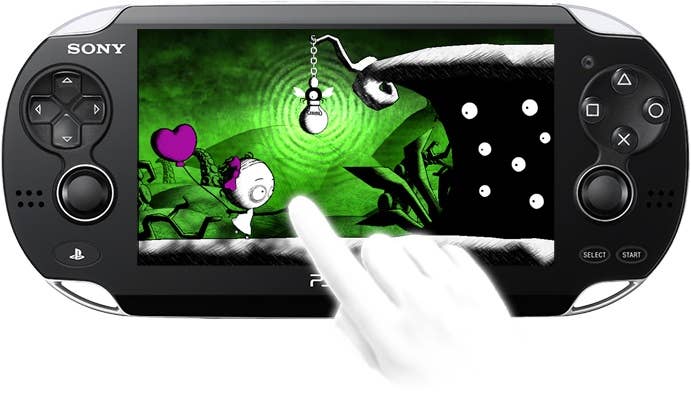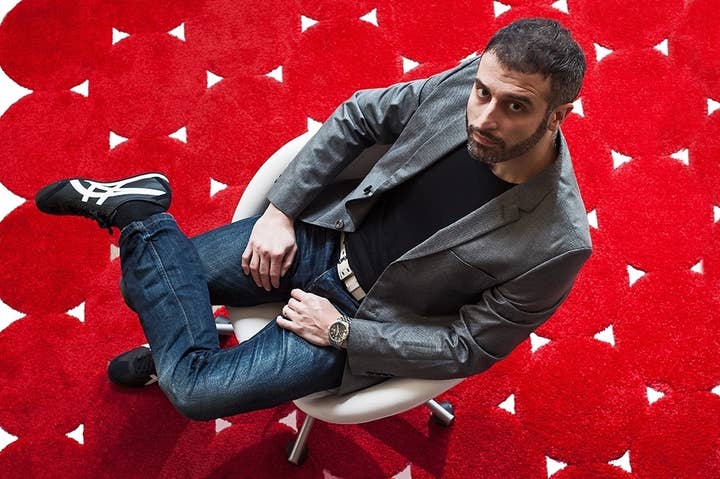Industry must ditch "private club" mentality - Murasaki Baby dev
Ovosonico's Massimo Guarini bothered by defensive responses to outsider criticism
Sony's Gamescom media briefing saw a big push for the PlayStation Vita, including a price cut on the hardware and announcements for a number of new exclusives and indie games. One title that fell into both categories was Murasaki Baby, the debut effort from Italian studio Ovosonico, created in cooperation with Sony Computer Entertainment Worldwide Studios Europe. Speaking with GamesIndustry International this week, Ovosonico CEO and creative director Massimo Guarini discussed the genesis of the project, which sees the player guide an unusual balloon-holding girl through a dark fantasy world using the Vita's touch screen.
"During a business trip, I saw a little girl holding a balloon in her hand on a train," Guarini explained. "And I was moved by that image, and thought how cool would it be to interact with her just by holding her hand. It's as simple as that. I really thought it could be the perfect tool to create some emotional content around the game."
As for why he settled on the PlayStation Vita as the ideal platform, Guarini said he narrowed down the potential platforms as soon as he thought about a gameplay mechanic, where the player swipes the back of the Vita to change the background of a level (from sunny to rainy, for example) as a way to solve puzzles. And when he took the idea to Sony, Guarini said the PlayStation maker was on board in under a minute, with no hesitation about the game's female protagonist or other such concerns.
"We honestly never ever thought about the market, the target, or anything like that," Guarini said. "It was so immediate to understand, so touching while we were all trying to play this weird game inside our heads, that there was no strategic discussion done of the product. I guess this will come up eventually, but honestly we didn't care too much about [marketing]."

Given the game's unusual premise and its home on a still-struggling Vita platform, one might expect Guarini to have had some inner conflict given his roles in charge of both the studio's creative direction as well as its financial well-being.
"There might be situations where wearing two different hats isn't very comfortable, but that's how it is in a small developer," Guarini said. "Fortunately, not being a company who does work-for-hire or any kind of services for third parties, we're in a good position where we can focus 100 percent on the game."
Even with self-publishing for indies set to become a standard on next-gen consoles and already ubiquitous elsewhere, Guarini said there were still some significant advantages to the traditional publisher-developer model.
"If we really want to be a more serious form of entertainment like movies and music are, we need to talk a broader language."
Massimo Guarini
"For me, working with publishers is still probably the best way to go for an independent developer, rather than trying the lottery and going on iOS or the App Store," Guarini said. "In that case, you would be literally overwhelmed by the amount of business development and marketing work you would have to do... On iOS, you definitely have access to a broader market, but you have a crazy average of like 100 new games a day coming out. Regardless of how good they are, the fact you have to be visible against 100 new games a day is just insane."
Guarini expects the indie scene on consoles to grow significantly as well, but no matter how influential or lucrative it gets, the developer said there's no way a PlayStation, Xbox, or Wii platform would see the same scale of competition issues. At the same time, he's not expecting indie games to be the lone factor in determining the outcome of the next-gen console wars.
"I really see the market and the content pool expanding quite fast, actually," Guarini said. "It would be a huge mistake to say independent developers aren't important for publishers or aren't going to be there in the future because of AAA. I'm not saying these smaller, creative games are going to be the future of gaming, in the same way I don't think free-to-play isn't the future. It's just another additional market segment for games. We're just expanding, not turning into something different."
Expanding the market is a recurring theme for Guarini. But to achieve that, he believes the industry needs to break some old behaviors and stereotypes.
"I feel the industry is celebrating itself all the time," Guarini said, "and whenever somebody who's not in the industry says something about games, you get all this bad reaction from people. 'How dare you say this? You don't know video games!' Well, you know what? I like comments from people who don't know video games and don't play video games, because that's exactly the kind of market we should look at. If we really want to be a more serious form of entertainment like movies and music are, we need to talk a broader language. We need to talk to normal people, not just to people who live inside of World of Warcraft or Lord of the Rings."
"It makes me feel like we're really like a private club. And from a creative point of view, I really don't like that aspect."
Massimo Guarini
Guarini admitted that breaking that behavior will be challenging, and called on creators across the board to be more willing to expand their vision beyond the typical subjects and to try "something a little bit more comprehensive." He also suggested that developers themselves are the cause of much of the problem, saying many of them cling to a teenage mindset, even if they're 40 or older.
"Whenever somebody tries to say something about expanding the medium, you get all sorts of negative reactions, like you're a sort of traitor and you're disrupting the whole thing," Guarini said. "But it's not about disrupting. It's about growing."
He pointed to David Cage as an example. Regardless of whether or not someone liked Heavy Rain's approach to gameplay, Guarini would like to see people try to understand what he's talking about rather than just trying to shut him up or slinging abuse his way on forums. Guarini was likewise dismayed by the amount of abuse celebrities and non-gamers receive when they talk about the industry.
"You can agree with them or disagree with them, but give them space to talk about games. You don't need to be a video game guru to talk about games," Guarini said. "It makes me feel like we're really like a private club. And from a creative point of view, I really don't like that aspect."
As for how such widespread behavior can change, Guarini said it was just a matter of time.
"I expect it's going to take another 10 years before we acknowledge the fact that it's OK for other people to make video games," Guarini said, "no matter if they're not Miyamoto or don't have 20 years of experience in the industry."

